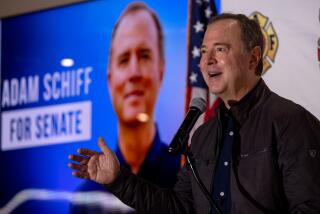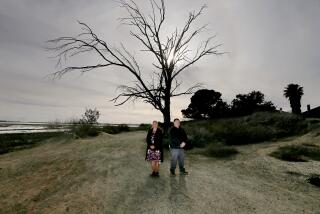On Storm, Bush Aims to Be Unlike Dad
Just as his father did 12 years before, President Bush is flying to Florida to survey the damage wrought by a major hurricane less than three months before facing a hotly contested election.
Republicans hope the parallels end there.
After Hurricane Andrew left thousands homeless in August 1992, the first President Bush’s administration was bitterly criticized for moving too slowly to deliver food, water and troops. Although his campaign vastly outspent Bill Clinton, his support ebbed and he was forced to defend what once had been considered home turf, winning by a small margin.
The federal response was noticeably different this week. Even before Hurricane Charley struck, the second Bush White House was poised to act, this time backed by another Bush in the Florida governor’s mansion. Hours after Hurricane Charley made landfall, federal aid was flowing, and the president was to arrive this morning.
Everybody this time also was aware of the political stakes: Florida’s 27 electoral votes are up for grabs, with the latest survey giving Democratic challenger John F. Kerry a 7-point lead in the state that decided the 2000 election by 537 votes.
For a president whose approach often seems designed to avoid the pitfalls as well as the fate of his father -- from the war in Iraq to the economy -- the response to Hurricane Charley follows the same pattern.
As emergency crews and National Guard troops swooped in to help residents across the state, the start of the cleanup Saturday brought a public relations effort apparently designed to show that history would not be repeated. President Bush, brother Jeb Bush -- Florida’s governor and the president’s state campaign chairman -- and other state Republicans showered Floridians with promises, assurances and lists of toll-free numbers they could call for help.
“While this is a day of complete devastation and real tragedy, and there’s a lot of sadness in people’s hearts right now, I’m absolutely convinced that, in a shorter period of time than we experienced in Hurricane Andrew, people’s hopes will be lifted,” Gov. Bush said.
At the same time, the state’s lieutenant governor, Toni Jennings, a Republican and a former state senator from Orlando, addressed reporters in her hometown. “We were better prepared than we’ve ever been before,” she said. Jeb Bush, as a resident of Miami in 1992 and a Florida director for his father’s reelection campaign, witnessed firsthand the personal and political fallout of the earlier storm.
While the governor and his lieutenant addressed televised news conferences in Punta Gorda, the site of the worst devastation, and elsewhere, the governor’s brother told those at a Sioux City, Iowa, campaign rally of his plan to visit Florida for the second time in a week. The president rolled through the Panhandle on his “Heart and Soul” bus tour Tuesday.
“I’m going to travel down to Florida to visit with those whose lives have been hurt by Hurricane Charley,” the president said. “I just want them to know that our federal government is responding quickly.”
Kerry, too, kept his eye on the situation in Florida -- where he and supporters were spending millions of dollars to defeat Bush. But on Saturday, while campaigning in Oregon, he asked his supporters in Florida to volunteer in disaster relief efforts.
Kerry, who travels with a full Secret Service detail and a press corps, said he had no immediate plans to visit the state. “For the moment, our focus is on all of the police and response personnel necessary not being diverted from a visitor, and really focusing on the recovery itself,” he said.
Kerry aides said he was reconsidering plans to travel to the state later this week.
The focus of Saturday’s public events was on ensuring that help found its way to thousands left homeless and without basic necessities. But Florida political insiders said the realities of the looming election were impossible to ignore.
Although Andrew was at the time the largest natural disaster to hit the country, Hurricane Charley was in many ways more of a political challenge.
Andrew’s wrath was isolated to a smaller area in a heavily Democratic part of the state. Charley struck southwest Florida, a fast-growing and heavily Republican region, and then cut a swath along Interstate 4 from conservative Polk County through suburban Osceola County, Orlando and then across Daytona Beach -- a region considered crucial for the president’s reelection.
Bush plans an early-morning visit today to Florida, with a stop in Punta Gorda.
Another political complication is that the storm could prove to be a major distraction from the state’s Aug. 31 primary election for the U.S. Senate, a race in which both parties feature competitive and crowded contests among candidates wanting to succeed retiring Democratic Sen. Bob Graham.
“This cut through a lot of good Republican turf, and then I-4 -- that’s a lot of swing voters,” said David Johnson, a Florida GOP consultant and former executive director of the state party. “They have to respond properly. The only problem that can happen here is if it was said or suggested that FEMA [the Federal Emergency Management Agency] wasn’t doing their job. That’s not going to happen this time.”
Johnson, who moved to Florida in 1992 to work for the party months before Andrew struck, said many observers at the time did not attribute Bush’s troubles to the hurricane. Instead, they attributed the closeness of the race to otherwise GOP-leaning voters who supported independent Ross Perot.
But John Cosgrove, a former Democratic state legislator whose home was destroyed by Andrew, sees parallels.
“You can’t take the politics out of the politics, and this is an election year,” said Cosgrove, who has helped Kerry raise money this year. “The response now is a result of a lesson learned from the confusion and a laggard response in 1992.”
Cosgrove credited Jeb Bush as a governor whose experiences in South Florida made him understand the need for a quick response to disaster.
The former legislator recalled being with Jeb Bush in a Homestead, Fla., emergency shelter after Andrew. Bush, then a private citizen running his father’s reelection effort in Florida and beginning to plan a gubernatorial campaign for 1994, called the president on the campaign trail.
“You have got to get down here,” Cosgrove recalled Bush telling his father.
The president did come for a quick stop. But it took days for the federal government to send substantial help -- especially troops to patrol the area.
Although no two political campaigns are alike, the current president does not have to go far to hear about the 1992 experience. Chief of Staff Andrew H. Card Jr. was secretary of Transportation at the time, and Vice President Dick Cheney was secretary of Defense. Both of their departments were responsible for portions of the eventual response in Florida.
The bitter experience of Hurricane Andrew seemed to echo in the aftermath of Hurricane Charley. In an expression of frustration in 1992, Dade County’s emergency management director demanded, “Where in the hell is the cavalry on this one?”
Early Saturday, as crews were still surveying damage, Gov. Bush seemed to be addressing that very question when he told reporters that they might see a modern-day cavalry of sorts on nearby interstate highways.
“My guess is that if people were on I-75 right now, they would see a phalanx of trucks and military support,” the governor said, promising that water, food, tents, electrical repair trucks and debris-removal teams were on the way.
*
Times staff writers Michael Finnegan in Hood River, Ore., and Maura Reynolds in Sioux City, Iowa, contributed to this report.
More to Read
Get the L.A. Times Politics newsletter
Deeply reported insights into legislation, politics and policy from Sacramento, Washington and beyond. In your inbox three times per week.
You may occasionally receive promotional content from the Los Angeles Times.






